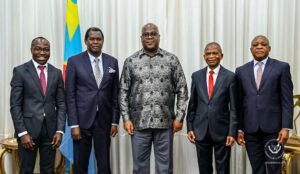A diplomatic and spiritual wind is blowing softly across the Great Lakes Region. It is carried on the back of a meeting that was both pastoral and profoundly political.
At the heart of it stood two men-the Democratic Republic of Congo (DRC) President Félix-Antoine Tshisekedi Tshilombo, and Ugandan Pentecostal preacher, Robert Kayanja. Their conversation this week at Mont Ngaliema in the DRC may have far-reaching implications for regional stability, spiritual awakening and agricultural transformation in Central and East Africa.
The talks were anchored on “Faith, Peace and Ploughs: How Uganda and DRC are Tilling New Ground for Regional Stability and Spiritual Revival.”
Held on Monday, July 14, the private but symbolic meeting brought together religious and national leadership to address enduring issues of peace in eastern DRC, economic development through agriculture and the strengthening of moral authority in governance—an increasingly central conversation in post-conflict African reconstruction.
Pastor Kayanja, a respected Ugandan Christian leader and founder of the Miracle Centre Cathedral in Kampala, did not visit as a politician. Yet his role as a faith-based influencer turned the meeting into a subtle act of spiritual diplomacy.
Flanked by Archbishop Évariste Ejiba Yamapia of Congo’s Church of Revival (ERC), Kayanja emphasised the shared religious and cultural DNA – or, deoxyribo-nucleic acid, between Uganda and DRC.
“Congo has stood tall for the African people over the years,” Kayanja said, thanking Tshisekedi for his openness and hospitality. He further reminded the audience of his connection to Congo, where his grandfather once served as a missionary during the early 20th-century East African revival.
In many ways, Kayanja’s remarks allude to a deeply spiritual narrative: one where revival, peace and development are intertwined. His planned return to Kinshasa for a major evangelical crusade featuring international Televangelist Benny Hinn signals an intent, not only to mobilise prayer, but also to boost people-to-people engagement and Continental solidarity.

The DRC, long troubled by violence in its eastern provinces, has recently increased collaboration with regional partners, including Uganda, Kenya and Rwanda to stabilize its borders. Uganda’s involvement, notably through joint military operations against the Allied Democratic Forces (ADF) in Eastern Congo, has met with mixed reactions. But in the midst of geopolitical tension, faith leaders are emerging as neutral players capable of bridging trust gaps, that politics alone cannot fill.
Tshisekedi’s willingness to engage directly with cross-border religious leaders like Kayanja points to a strategic shift—one that acknowledges the moral capital of the Church as a unifying force. Archbishop Yamapia’s presence reinforced this, presenting a unified regional faith front that transcends national interests.
Perhaps, the most tangible aspect of the meeting was Kayanja’s promise to bring practical agricultural projects to DRC, aligning with Tshisekedi’s broader vision for economic recovery through agri-business.
With food insecurity and poverty still plaguing much of the Eastern DRC, Kayanja’s offer resonates with more than symbolism. He mentioned receiving international awards for innovation in agriculture and pledged to return with solutions, possibly leveraging Uganda’s recent strides in agro-tech and community farming models.
This agro-spiritual collaboration could open a new chapter in Uganda–DRC relations, one focused less on troop deployments and more on tractor diplomacy. Faith leaders like Kayanja could become informal ambassadors of development, drawing in donors, NGOs and regional investors.
The July 14 meeting fits into a larger pattern of warming ties between Kinshasa and Kampala. Since 2022, both governments have engaged in joint infrastructure projects, including the construction of roads connecting Eastern Congo to Uganda. What has been missing—until now—is a coordinated soft-power framework that includes cultural, religious and grassroots collaboration.
The fact that Kayanja’s proposed crusade has presidential approval speaks volumes. It illustrates the growing respect for faith-based initiatives in shaping national narratives, building moral consensus, and fostering resilience in fragile regions.
At a time when the African Continent grapples with external pressures—from Climate Change and conflict to economic instability—this meeting at Mont Ngaliema offered a refreshing alternative: a conversation rooted in revival, peace and self-sufficiency.
It was not just a meeting of a preacher and a president. It was a convergence of vision: of planting spiritual seeds and agricultural solutions in the fertile soil of Central Africa. If followed through, the legacy of this dialogue could redefine the role of the Church in shaping post-conflict Africa—not merely as a moral compass, but as an engine of development, diplomacy and durable peace.
comments











